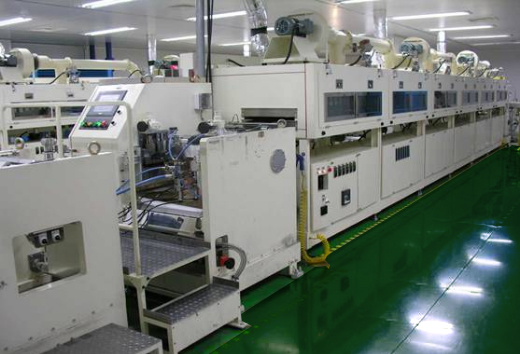Revolutionizing Communication: The Power of Lithium Batteries in Base Stations
Introduction
In the fast-paced world of communication, base stations play a critical role in ensuring seamless connectivity. These stations transmit and receive signals, facilitating the exchange of information between devices. However, to operate efficiently, they require a reliable and long-lasting source of power. In recent years, lithium batteries have emerged as a game-changer, revolutionizing base station technology. This article explores the power of lithium batteries in base stations and their impact on communication.
1. Enhanced Performance
Lithium batteries offer numerous advantages over traditional lead-acid batteries, making them ideal for powering base stations. Firstly, they have a significantly higher energy density, meaning they can store more energy in a smaller and lighter package. This compact design allows for easier installation and flexibility in locating base stations, even in remote areas where power sources may be limited.
Moreover, lithium batteries have a longer lifespan compared to traditional batteries. They can withstand a higher number of charge-discharge cycles, resulting in reduced maintenance costs and increased uptime for base stations. The longevity of lithium batteries also ensures uninterrupted communication, crucial in emergency situations or during natural disasters.
2. Improved Efficiency
Base stations powered by lithium batteries operate with enhanced efficiency. Unlike lead-acid batteries, lithium batteries have low self-discharge rates, meaning they retain their charge for longer periods when not in use. This characteristic eliminates the need for frequent recharging, reducing energy waste and optimizing power consumption. As a result, base stations can operate for extended periods without requiring constant monitoring and manual intervention.
Additionally, lithium batteries exhibit fast charging capabilities, allowing base stations to quickly replenish their power reserves. This feature is especially beneficial in areas with unstable or intermittent power supply, as it ensures continuous operation during power outages. The ability to recharge rapidly also minimizes downtime during maintenance or battery replacement, maximizing the availability of communication services.
3. Environmental Sustainability
The increasing concern for environmental sustainability has driven the adoption of lithium batteries in base stations. Unlike lead-acid batteries, lithium batteries are free from harmful substances such as lead and acid, making them more eco-friendly. The absence of toxic materials reduces the risk of soil and water contamination, benefiting both human health and the ecosystem.
Moreover, lithium batteries have a higher energy efficiency, resulting in reduced greenhouse gas emissions during the generation of electricity. This characteristic aligns with the global efforts to mitigate climate change and transition towards renewable energy sources. By embracing lithium battery technology, base stations contribute to a greener and more sustainable communication infrastructure.
4. Future Advancements
As technology continues to advance, lithium batteries in base stations are poised for further improvements. Ongoing research aims to increase their energy density, allowing for even greater storage capacity within a smaller footprint. This development would enable base stations to operate for extended periods without the need for frequent recharging, enhancing their autonomy and resilience.
Furthermore, advancements in lithium battery management systems will improve monitoring and control capabilities. Real-time data collection and analysis will enable proactive maintenance and predictive failure detection, reducing downtime and optimizing performance. These advancements will revolutionize base station operations, ensuring seamless communication in an increasingly connected world.
Conclusion
Lithium batteries have revolutionized base stations, enhancing performance, improving efficiency, and promoting environmental sustainability. These batteries offer a compact and lightweight design, extended lifespan, and fast charging capabilities. Moreover, they are free from harmful substances, minimizing their ecological impact. As technology continues to evolve, further advancements in lithium battery technology will undoubtedly shape the future of base station operations, leading to seamless and reliable communication worldwide.
-
 Introduction: A computer mouse has become an essential tool for navigating through various tasks on a computer screen. Whether you are a gamer, a graphic designer, or simply someone who spends long hours in front of a computer, having a reliable and high-performing mouse is crucial. One key component that plays a significant role in ensuring the optimal performance of a...Read more
Introduction: A computer mouse has become an essential tool for navigating through various tasks on a computer screen. Whether you are a gamer, a graphic designer, or simply someone who spends long hours in front of a computer, having a reliable and high-performing mouse is crucial. One key component that plays a significant role in ensuring the optimal performance of a...Read more -
 Introduction The world has witnessed a significant shift towards the use of advanced battery technology. This paradigm shift is commonly referred to as the Battery Industrial Revolution, which is transforming various industries and paving the way for a sustainable future. The advancements in battery technology have made it possible to power a wide range of applications, from electric vehicles...Read more
Introduction The world has witnessed a significant shift towards the use of advanced battery technology. This paradigm shift is commonly referred to as the Battery Industrial Revolution, which is transforming various industries and paving the way for a sustainable future. The advancements in battery technology have made it possible to power a wide range of applications, from electric vehicles...Read more -
 Golf carts have become a popular mode of transportation on golf courses and in residential communities. These electric vehicles provide a convenient and eco-friendly way to get around. However, like any other electric vehicle, golf carts rely on batteries for power. In this article, we will discuss everything you need to know about golf cart batteries. Types of Golf...Read more
Golf carts have become a popular mode of transportation on golf courses and in residential communities. These electric vehicles provide a convenient and eco-friendly way to get around. However, like any other electric vehicle, golf carts rely on batteries for power. In this article, we will discuss everything you need to know about golf cart batteries. Types of Golf...Read more -
 Introduction: In recent years, there has been a growing concern about environmental sustainability and the need for more efficient power solutions across various industries. The forklift industry is no exception, as it plays a vital role in material handling operations. Traditionally, forklifts have been powered by lead-acid batteries, which have several limitations. However, with the advancement in technology, the introduction...Read more
Introduction: In recent years, there has been a growing concern about environmental sustainability and the need for more efficient power solutions across various industries. The forklift industry is no exception, as it plays a vital role in material handling operations. Traditionally, forklifts have been powered by lead-acid batteries, which have several limitations. However, with the advancement in technology, the introduction...Read more -
 In emergency situations, having a reliable source of power is crucial. Whether you're facing a power outage, a natural disaster, or any other unexpected event, having access to electricity can mean the difference between safety and danger. That's why it's essential to have an effective starter battery as part of your emergency preparedness plan. A starter battery is a...Read more
In emergency situations, having a reliable source of power is crucial. Whether you're facing a power outage, a natural disaster, or any other unexpected event, having access to electricity can mean the difference between safety and danger. That's why it's essential to have an effective starter battery as part of your emergency preparedness plan. A starter battery is a...Read more -
 An emergency starter battery is an important tool to have in your vehicle, especially if you are someone who frequently goes on long road trips or drives in remote areas. This device is designed to ensure that you never run out of power, even when your primary battery fails to start your engine. The emergency starter battery, also known...Read more
An emergency starter battery is an important tool to have in your vehicle, especially if you are someone who frequently goes on long road trips or drives in remote areas. This device is designed to ensure that you never run out of power, even when your primary battery fails to start your engine. The emergency starter battery, also known...Read more -
 If you’re looking for a reliable, long-lasting battery to power your devices or equipment, look no further than a 100Ah LiFePO4 lithium battery. This advanced battery technology offers numerous benefits over traditional lead-acid batteries, making it the perfect choice for a wide range of applications. What is a LiFePO4 Lithium Battery? LiFePO4 stands for lithium iron phosphate, which...Read more
If you’re looking for a reliable, long-lasting battery to power your devices or equipment, look no further than a 100Ah LiFePO4 lithium battery. This advanced battery technology offers numerous benefits over traditional lead-acid batteries, making it the perfect choice for a wide range of applications. What is a LiFePO4 Lithium Battery? LiFePO4 stands for lithium iron phosphate, which...Read more


